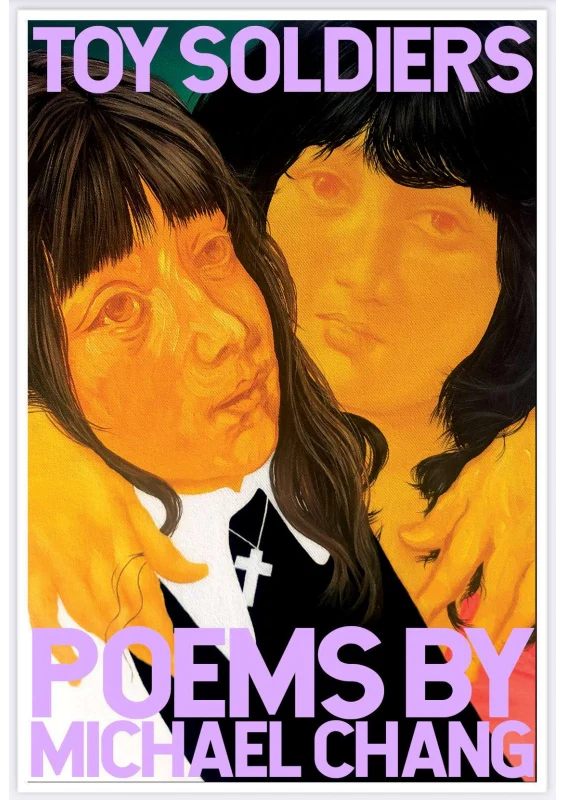Poems of Refusal: A Review of Michael Chang’s Toy Soldiers
By Shelby Pinkham
Toy Soldiers. Michael Chang. Action, Spectacle; October 2024. $17.95.
Michael Chang’s fourth collection, Toy Soldiers (Action, Spectacle Press), is part prayer, part pop culture generator, and a scathing anti-ode to our justice system. Of our Supreme Court, they write, “the cardinal sin of poetry (no stakes) has been a pattern and practice of legal systems since time immemorial, and judges have not been immune.”
What obliterates me about this collection is how richly piquant, sincere, and cutting the poems are. I unattractively guffawed (please note that no one has ever guffawed in an attractive way) several times while reading the list poem, “B is for Brutus.” Here, they proclaim, “for a painter, paul klee had many stupid quotes” and “director of lobster movie foiled by electricity & emotional shortcomings” and “puccini popped my cherry, called me wimp.” Chang taps into the specific self-masturbatory-ness of the arrogant artist, “greco coffee cup blessed by capote who said scorsese was a ‘big nothing.’” No self-important creator is left untouched, including Pynchon.

It should be noted that Toy Soldiers is against all old masters, “the only sadder job than poet laureate is former poet laureate.” If we no longer want masters, why a poet laureate? We should rewrite the national anthem, right? Who still thinks this court is supreme?
These are the questions that Chang left me with… It’s that they aren’t afraid to be coy and sexy and weird when confronting these topics. All that is left in. So, I don’t feel beaten over the head with these poems. Chang reveals,
white lady complimenting my houndstooth coat
shamelessly comparing it to her mother’s
i pull my coat closer
tell her i am ur mother !!!
lecture her on voting rights
how never to put “rat-a-tat-tat” in a poem
Instead, I feel like my smart friend is tenderly offering me truth in the blunt rotation. And isn’t that a necessary model for poem-building? For political outrage?
I’ve been obsessing over poetry as a form of rejection since a recent craft talk that I attended in June led by Ari Banias. In that talk, Banias drew on Anne Boyer’s A Handbook of Disappointed Fate, specifically, the essay simply entitled “No,” in which Boyer writes, “words are useful for upending the world in that they are cheap, ordinary, portable, and generous…” Poetry, at its best, rejects the mainstream, the status quo, the police, and yes, ALL institutions. That rejection shimmers here.
For Bomb Magazine, on their successful reception of Synthetic Jungle, Chang explains, “grad students want to know how to get published, but I don’t think about process that way… I’m trying to make the poetry I want to see in the world instead.” The rejection of institutionalized poetix is alive and well in Toy Soldiers:
internet socialist u do too much trying to sell
[ dance-jam escapism as revolution ]
thin skin glass jaw tell me what i’m missing
[ sinners, curdled anger, david foster wallace ]
cultural vandalism half-baked knock-offs generic sloganeering
Here, Chang, as they often do, invites us to burn down what is no longer serving us. They serve rejection, not revenge. It’s a refreshing modality.
Of the varying forms found in the book, I was most enamored with the diptychs. In the titular poem, “Toy Soldiers,” for example, Chang muses “our affections / build a ship in a basement / before figuring how to get it up / the stairs.”
Kate Carmody, in conversation with Chang for Electric Lit, comments on the binaries that exist in Almanac of Useless Talents, “avant-garde and anarchist. Intertextual and reality. Surreal and real. Ugly and pretty. Crystal-clear and obscure. Confident and confessional. Serious and absurd. I speak in binaries, but Chang’s poems are anything but. They deconstruct binaries.”
Toy Soldiers continues this work of binary bending. Opposite affections, again, returning to the title poem, “u came from the same demonic womb / i washed the sexless lord outta my hair / […] burping nasty back into a can” Here, tenderness and the grotesque hold mirrors to one another. Not perfect opposition, no. But something unsettling emerges from these woven images.
We see this unsettling of duality again in “Anatomy of an Evening Diptych.” Chang writes,
to be taken to the cleaners an auspicious event only if it’s the chinese laundry
owner dozing off w. radio i cut / u deal everybody gets something
the same card in the same hand one thing on top of another we understand
when to trade how to play w. my face on the floor if u want to make god
laugh tell them ur a poet haunting us like happiness
u moaning into a pillow abt needing more time, me leaning on u like a hospice
cot, naked knees, unclean hands, old new york post neatly folded, i beg— u
pretend to sleep— a great bloodlust shared between us like breath or an admission
of love
That an evening can contain laundry and intimacy. That a single night can humble you to cleaning, breathing, loving, caring, fucking. What unsettles us more than intimacy alongside the mundane?
More than anything, Toy Soldiers is an invitation to unsettle and be unsettled. It’s an invitation to refuse and be refused. These poems remind me to reject what is not serving me, to be unafraid to publish the unpopular opinion, to share the unsafe image, to name abusers, to identify the empty gesture, to refuse the two-party system, to reject the American empire, to denounce genocide.
Shelby Pinkham is a Chicanx, bipolar poet from California’s Central Valley. They earned an MFA at Fresno State, where they taught composition and poetry. In 2022, they were selected for Lambda Literary’s Emerge Editorial Scholarship and fellowship at the Writer’s Retreat for Emerging LGBTQ Voices. Their writing has appeared in ANMLY, ctrl + v, Huizache, and Honey Literary.
